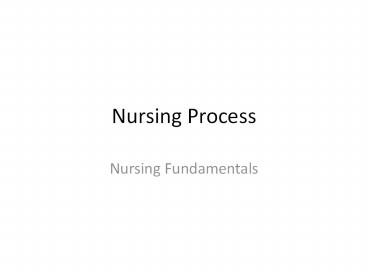Nursing Process PowerPoint PPT Presentation
1 / 30
Title: Nursing Process
1
Nursing Process
- Nursing Fundamentals
2
Introduction
- Nursing process
- is a systematic method of providing care to
clients - Allows nurses to communicate plans and activities
to - Clients
- Other health care professionals
- Families
- Encourages orderly thought, analysis, planning
3
Overview of the Nursing Process
- Process
- A series of steps or acts that lead to
accomplishment of some goal or purpose - Purpose is to provide client care that is
- Individualized
- Holistic
- Effective
- Efficient
4
Overview of the Nursing Process
- Consists of 5 steps
- Assessment
- Diagnosis
- Planning
- Implementation
- Evaluation
- Build on each other
- Not linear
5
- Nursing process is dynamic and requires
creativity in its application - Steps remain the same
- Application and results different
- Used throughout the life span in any care setting
6
Small group questions
- How many steps are in the nursing process?
- What are the names of each of the steps?
- What is the purpose of the nursing process?
- In what clinical setting is the nursing process
used?
7
Assessment
- Step 1
- Involves
- Collecting data (from variety of sources)
- Validating the data
- Organizing the data
- Interpreting the data
- Documenting the data
8
Assessment
- Purpose of assessment
- Data collection
- Types of assessment
- Comprehensive assessment
- Focused
- Ongoing
9
Assessment
- Comprehensive assessment
- Baseline
- Physical psychosocial
10
Assessment
- Focused Assessment
- Limited in scope
- Screening for a specific problem
- Short stay
- Ongoing assessment
- Follow-up
- Monitoring and observation related to specific
problems
11
Assessment
- Sources of Data
- Primary sources
- Client
- Interview
- Physical examination
- Secondary sources
- Family members
- Other health care providers
- Medical records
12
Assessment
- Types of data
- Subjective
- Data from the clients point of view
- Feelings, Perceptions, Concerns
- Main way to collect subjective data
- Interview
- Objective
- Observable measurable data
- Main way to collect objective data
- Physical assessment
- Lab and diagnostic testing
13
Assessment
- Validating the Data
- Organizing the Data
- Interpreting the Data
- Relevant vs. irrelevant
- Gaps?
- Identify patterns
- Document the Data
14
Small group questions
- Baby Jane a 2 month infant goes into the doctor
for her initial immunization and well baby
check-up. What type of assessment should the
nurse perform? - A. Comprehensive
- B. Focused
- C. Ongoing
15
Small Group Question
- Give an example of a primary source of data?
- Give an example of a secondary source of data?
16
Small Group Questions
- 4. Which of the following are objective data and
which are subjective data. - A. Nausea
- B. Vomiting
- C. Unsteady gait
- D. Anxiety
- E. Bruises on the right arms and face
- F. Temperature 101 F
17
Diagnosis
- Step 2 in the nursing process
- Formulating a nursing diagnosis
- Analysis and synthesis of data
18
- Nursing diagnosis
- A clinical judgment about individual, family or
community responses to actual or potential heal
problems / life processes. - A nursing diagnosis provides the basis for
selection of nursing interventions to achieve
outcomes for which the nurse is accountable.
19
Medical vs. Nursing diagnosis
Medical diagnosis Nursing diagnosis
Identifies conditions the MD is licensed qualified to treat Identifies situations the nurse is licensed qualified to treat
20
Medical vs. Nursing diagnosis
Medical diagnosis Nursing diagnosis
Identifies conditions the MD is licensed qualified to treat Identifies situations the nurse is licensed qualified to treat
Focuses on illness, injury or disease processes Focuses on the clients responses to actual or potential health / life problems
21
Medical vs. Nursing diagnosis
Medical diagnosis Nursing diagnosis
Remains constant until a cure is effected Changes as the clients response and/or the health problem changes
22
Medical vs. Nursing diagnosis
Medical diagnosis Nursing diagnosis
Remains constant until a cure is effected Changes as the clients response and/or the health problem changes
i.e. Breast cancer i.e. Knowledge deficit Powerlessness Grieving, anticipatory Body image disturbance Individual coping, ineffective
23
Diangosis
Nursing diagnosis Medical diagnosis
Breathing patterns, ineffective Chronic obstructive pulmonary disease
Activity intolerance Cerebrovascular accident
Pain Appendectomy
Body image disturbance Amputation
Body temperature, risk for altered Strep throat
24
Planning Outcome identification
- Step 3
- Types of planning
- Initial planning
- Ongoing planning
- Discharge planning
25
Planning Outcome identification
- Identifying outcomes
- Goals
- An aim, intent or end.
- Short term goals
- Hours to days (less than a week)
- Long term goals
- Weeks to months
26
Planning Outcome identification
- Developing specific nursing interventions
- Independent nursing interventions
- No order needed
- Elevate edematous legs
- Interdependent nursing interventions
- In conjunction with an interdisciplinary team
member - Assist client with physical therapy exercises
- Dependent nursing interventions
- Require an order
- Administering of medications
27
- Prioritizing the nursing diagnosis
- Maslows hierarchy of needs
28
Maslows Hierarchy of Needs
29
Implementation
- 4th step
- Execution of the nursing care plan
- Delegation
- DO IT
- DO IT RIGHT
- DO IT RIGHT NOW!
30
Evaluation
- 5th step
- Determining whether the clients goals have been
met, partially met or not met.

